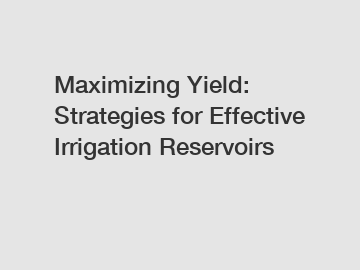Maximizing Yield: Strategies for Effective Irrigation Reservoirs
Maximizing Yield: Strategies for Effective Irrigation Reservoirs.
Irrigation reservoirs play a crucial role in optimizing agricultural production by providing water for crops during dry spells. Maximizing the yield from these reservoirs is essential for ensuring that crops receive adequate water supply throughout the growing season. In this article, we will discuss strategies for effective irrigation reservoir management that can help farmers maximize their yield and increase overall productivity.
Assessing Water Needs.

Before implementing any strategies for irrigation reservoir management, it is essential to assess the water needs of the crops being grown. Different crops have varying water requirements, and understanding these requirements is crucial for determining the optimal water supply from the reservoir. Factors such as soil type, climate, and crop growth stage should also be taken into consideration when assessing water needs.
Investing in Water Conservation Measures.
Water conservation is a critical aspect of efficient irrigation reservoir management. Investing in water conservation measures such as drip irrigation systems, mulching, and soil moisture sensors can help minimize water wastage and ensure that crops receive the right amount of water. These measures not only help conserve water but also contribute to reducing production costs and improving overall crop yield.
Monitoring and Maintenance.
Regular monitoring and maintenance of irrigation reservoirs are essential for ensuring optimal performance and maximizing yield. Checking for leaks, sediment buildup, and algae growth can help prevent water loss and contamination, which can negatively impact crop productivity. Implementing a regular maintenance schedule and monitoring system can help identify and address issues before they escalate.
Implementing Water Rotation Strategies.
Water rotation strategies involve alternating the use of different reservoirs or water sources to ensure a continuous water supply for crops. By rotating water sources, farmers can prevent the depletion of a single reservoir and reduce the risk of water shortages during peak demand periods. Implementing water rotation strategies can help optimize water usage, increase reservoir efficiency, and maximize crop yield.
Utilizing Rainwater Harvesting.
Rainwater harvesting is an effective way to supplement irrigation reservoirs and reduce reliance on groundwater sources. Capturing rainwater using collection systems such as rain barrels or cisterns can provide an additional water supply for crops during dry periods. Integrating rainwater harvesting into irrigation reservoir management can help conserve water, reduce costs, and increase agricultural productivity.
Conclusion.
Maximizing yield from irrigation reservoirs requires careful planning, monitoring, and implementation of effective water management strategies. By assessing water needs, investing in water conservation measures, conducting regular maintenance, implementing water rotation strategies, and utilizing rainwater harvesting, farmers can optimize water usage, increase crop yield, and improve overall agricultural productivity. Effective irrigation reservoir management is essential for sustainable farming practices and ensuring food security for future generations.
Contact us for more information on maximizing yield through effective irrigation reservoir management and irrigation reservoir construction services.
Want more information on flood discharge dam, landscape Hydraulic Elevator Dam, Containerized Sewage Treatment Plant? Feel free to contact us.

Comments